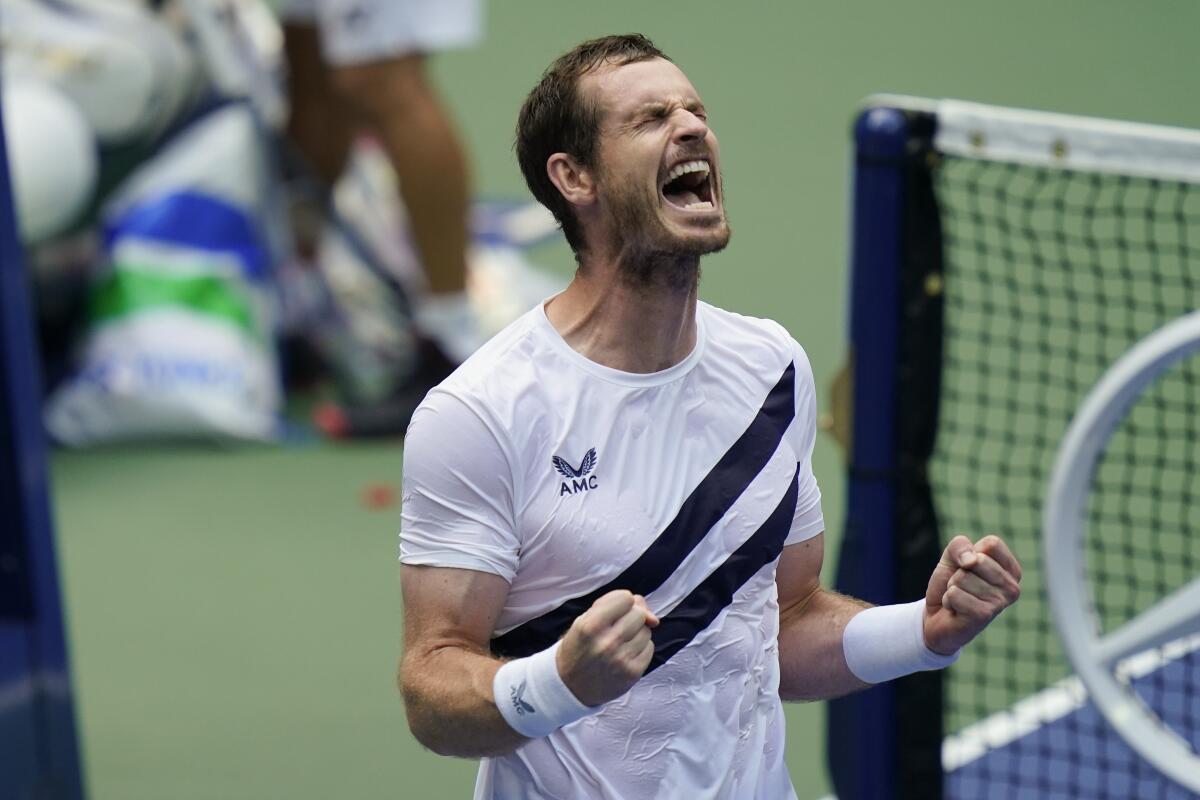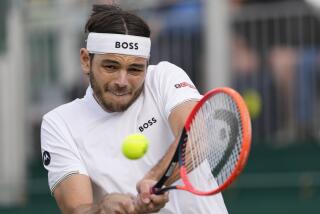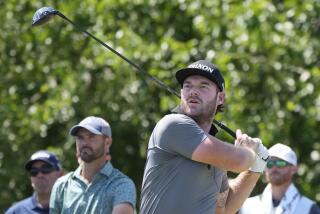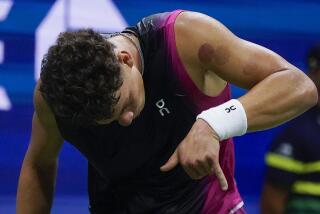U.S. Open: Andy Murray makes comeback victory, Serena Williams wins

- Share via
NEW YORK — This is was the sort of match Andy Murray came back for, the sort of competition and comeback he always lived for, the reason he went through two hip operations and all the hard work that followed.
And it was the type of vintage Murray performance — undaunted by a deficit, adjusting on the fly, muttering all the way — that was too compelling not to watch, so while there are no fans allowed into this U.S. Open because of the pandemic, fellow pros made their way into the stands to see the popular 2012 champion save a match point Tuesday and, eventually, win.
Playing his first Grand Slam match in nearly 20 months, toiling on his metal hip for 4 hours, 39 minutes in Arthur Ashe Stadium, Murray put together his 10th career comeback from two sets down and beat Yoshihito Nishioka 4-6, 4-6, 7-6 (5), 7-6 (4), 6-4.
“It was pretty emotional straight after the match finished, when I got back to the locker room — sort of look at my phone, see the messages from family and friends, the team and stuff. They’re the people that have kind of seen me go through everything, been there, seen the tough times,” said Murray, who next plays 15th-seeded Felix Auger-Aliassime, a 20-year-old from Canada.
“I don’t know how many of us actually believed I’d be back kind of winning matches like that.”
Murray’s big concern after the match was whether he could get permission to use the ice bath in the Ashe locker room (he later said he did).
“They said it’s for emergencies. For me, this is an emergency right now. My body hurts,” said the 33-year-old Murray, who was treated for blisters on his two big toes by a trainer during a medical timeout. “That’s by far the most tennis I’ve played since 2019, really.”
And so many of the sport’s biggest names were there to witness it.
They included Novak Djokovic, Dominic Thiem, Naomi Osaka, Garbine Muguruza and others, some noshing while sitting on the balconies of their personal “lounges” — Ashe suites that normally bring in hundreds of thousands of dollars during this tournament but were assigned to seeded players because of the ban on spectators.
The Murray match provided the most entertainment in the afternoon of Day 2 at Flushing Meadows, where his lengthy victory was followed in Ashe by a straight-set win for Serena Williams.
“Usually when you’re waiting for a match (and) someone is down two sets, you root for the person that’s ahead so you can get on the court and get off,” said Williams, who defeated Kristie Ahn 7-5, 6-3 for her 102nd match win at the U.S. Open, breaking a tie with Chris Evert for most in the professional era.
“I was rooting for Andy the whole time. I really wanted him to win,” Williams said. “Gosh, when he was down in the third set, I was like, `All right!’ I was just rooting for him so hard.”
She then went out and sat in the stands herself to watch her older sister, Venus, take on 20th-seeded Karolina Muchova at night. Muchova won 6-3, 7-5, making it the first loss for Venus in the opening round in New York in 22 appearances.
That was to be followed by 2019 men’s runner-up Daniil Medvedev against Federico Delbonis.
“It’s rare that you have lots of, like, players watching your match,” Murray said. “In some ways, that can be a little bit distracting, if you look up and you’ve got guys that are in the Top 5, Top 10 in the world watching you and stuff.”
Thiem, a three-time major runner-up, and Muguruza, a two-time Grand Slam champion but never in New York, advanced earlier, as did 2014 U.S. Open champion Marin Cilic, 2017 U.S. Open champion Sloane Stephens, reigning Australian Open champion Sofia Kenin, No. 9 seed Johanna Konta and No. 16 Elise Mertens.
A player who can appreciate Murray’s journey perhaps as much as anyone is Andrey Kuznetsov, a 29-year-old Russian who missed about 2 1/2 years because of his own hip injury. Kuznetsov eliminated Sam Querrey 6-4, 7-5 (6), 6-2, becoming the first unranked man to win a Grand Slam match since Nicolas Kiefer at Wimbledon in 2007.
Murray is a former No. 1-ranked player whose resume also includes two Wimbledon championships and two Olympic singles gold medals.
But he had surgery on his right hip in January 2018, then again in January 2019, shortly after a first-round loss at the Australian Open. He figured he would need to retire from tennis.
Murray eventually returned to the tour last season. A pelvic problem — combined with the sport’s coronavirus-caused hiatus — kept him off the tour from last November until this August, when he won twice and lost once at the Western & Southern Open, a tournament played at the U.S. Open site.
But those matches were all best-of-three sets, not best-of-five, so the demands were much greater against the 49th-ranked Nishioka, a lefty who can retrieve opponents’ shots with the best of them but is just 2-6 for his career at Flushing Meadows.
Murray did himself no favors with 13 double-faults, and he trailed by two sets and a break.
“The big toes on both sides are pretty beat up, but I did all right physically. I think at the beginning of the match, I was apprehensive about playing a long match because I haven’t done one for a while,” Murray said. “Once I got two sets down, I had to start turning the afterburners on and managed to get through it.”
Still, after getting more aggressive with his forehand to dictate points more and making other changes just to extend things to a fourth set, Murray was a point from losing while serving at 30-40 and trailing 6-5.
He saved that with a 127 mph service winner and soon was into a fifth set.
Even then, Murray wasn’t in the clear. He double-faulted to get broken and trail 3-2, but managed to do what he has done so many times over the years — break right back and then make a charge to the finish line.
More to Read
Go beyond the scoreboard
Get the latest on L.A.'s teams in the daily Sports Report newsletter.
You may occasionally receive promotional content from the Los Angeles Times.










